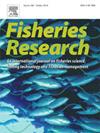以欧洲海底拖网渔业中褐家鼠为例,对丢弃生存实验进行meta分析的建模框架
IF 2.3
2区 农林科学
Q2 FISHERIES
引用次数: 0
摘要
对商业或休闲渔业弃置物存活情况的良好了解是实现更准确的种群评估和支持基于证据的监管措施的关键;然而,估计丢弃物的存储量是一项挑战。为了提高区域尺度上存活率的估计并确定关键驱动因素,我们在此提出了一个元回归(MR)框架,该框架考虑了个体研究在实验设计、质量和背景特异性方面的差异。首先,研究通过系统的批判性审查进行过滤,以排除被认为过于不确定或有潜在偏见的结果。然后对丢弃存活率进行修正,以限制估计方法的偏差,并将相关的不确定性作为权重包括在内。最后,在分层混合效应框架下应用MR,以解释数据的嵌套结构并纠正实验引起的死亡率偏差。我们说明了MR如何解决欧洲海底拖网渔业丢弃的挪威龙虾(Nephrops norvegicus)在丢弃生存研究中的方法和分析局限性。虽然一些影响已经从单一研究中确定,如温度变化,但核磁共振强调了在区域尺度上无法察觉的其他影响,这些影响在捕鱼作业的规模上变化更大,如拖拽时间,但也与实验对象的大小和生理有关。这种灵活的框架适用于其他物种或环境。该案例研究为未来的生存研究提供了建议,以提高这种类型MR的预测潜力,例如遵循标准化方案和分析的重要性,以及以最佳分辨率报告数据。本文章由计算机程序翻译,如有差异,请以英文原文为准。
A modeling framework to meta-analyse discard survival experiments illustrated by Nephrops norvegicus in European demersal trawl fisheries
Good knowledge of discard survival in commercial or recreational fisheries is key in enabling more accurate stock assessments and supporting evidence-based regulatory measures; however, estimating discard survival is challenging. To improve the estimation of survival rate at regional scales and to identify key drivers, we present here a meta-regression (MR) framework that considers differences in experimental design, quality and context specificity between individual studies. First, studies are filtered through a systematic critical review to exclude results considered too uncertain or potentially biased. Discard survival rates are then corrected to limit estimation method bias, and associated uncertainty is included as a weighting. The MR is finally applied under a hierarchical mixed-effects framework to account for the nested structure of the data and correct for experimentally induced mortality bias. We illustrate how the MR can address methodological and analytical limitations in discard survival studies using Norway lobster (Nephrops norvegicus) discarded from European demersal trawl fisheries. While some effects were already identified from single studies, such as the temperature change, the MR highlighted other effects not perceptible at a regional scale, varying more at the scale of the fishing operation, such as tow duration, but also related to the size of experimental subjects and physiology. This flexible framework has applicability to other species or contexts. The case study provided insights to make recommendations for future survival studies to improve the predictive potential of this type of MR, such as the importance of following standardized protocols and analyses, and to report data at the finest resolution.
求助全文
通过发布文献求助,成功后即可免费获取论文全文。
去求助
来源期刊

Fisheries Research
农林科学-渔业
CiteScore
4.50
自引率
16.70%
发文量
294
审稿时长
15 weeks
期刊介绍:
This journal provides an international forum for the publication of papers in the areas of fisheries science, fishing technology, fisheries management and relevant socio-economics. The scope covers fisheries in salt, brackish and freshwater systems, and all aspects of associated ecology, environmental aspects of fisheries, and economics. Both theoretical and practical papers are acceptable, including laboratory and field experimental studies relevant to fisheries. Papers on the conservation of exploitable living resources are welcome. Review and Viewpoint articles are also published. As the specified areas inevitably impinge on and interrelate with each other, the approach of the journal is multidisciplinary, and authors are encouraged to emphasise the relevance of their own work to that of other disciplines. The journal is intended for fisheries scientists, biological oceanographers, gear technologists, economists, managers, administrators, policy makers and legislators.
 求助内容:
求助内容: 应助结果提醒方式:
应助结果提醒方式:


